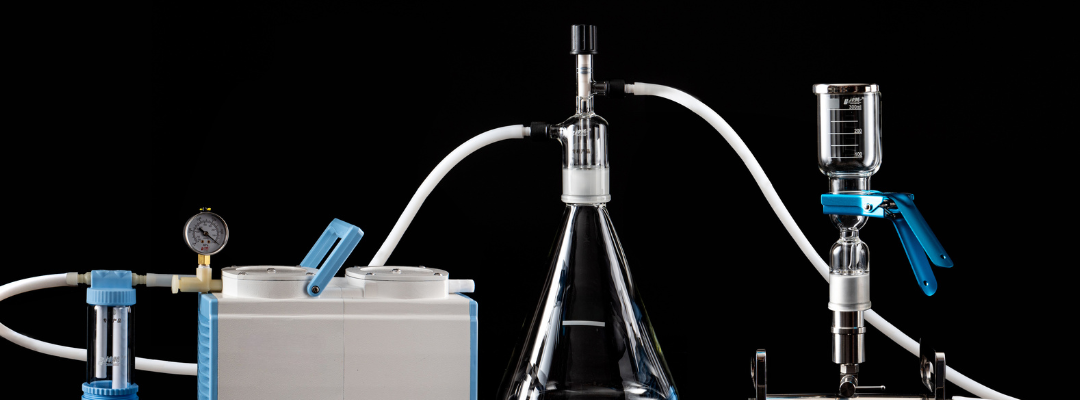When selecting pumps for scientific laboratory applications, it’s essential to consider factors such as the type of fluids being handled, required flow rates, pressure needs, and the degree of precision needed for the experiments. Below are some common types of pumps used in scientific laboratories along with their typical applications:
1. Peristaltic Pumps
- Application: Ideal for handling sensitive fluids, sterile applications, and when avoiding contamination is critical. Often used for dosing, mixing, and transferring liquids in biochemistry, microbiology, and chemical labs.
- Advantages:
- No contamination as the fluid only contacts the tubing.
- Precise flow control.
- Ideal for viscous or shear-sensitive fluids.
- Typical Fluids: Buffers, cell cultures, reagents, slurries, etc.
2. Vacuum Pumps
- Application: Used in laboratories for applications such as vacuum filtration, degassing, drying, and vacuum distillation. These are critical in chemical analysis, sample preparation, and equipment like rotary evaporators.
- Types:
- Rotary vane pumps
- Diaphragm pumps
- Scroll pumps
- Advantages:
- Can achieve high vacuum levels.
- Low maintenance for oil-free versions.
- Typical Fluids: Gases and vapors (used to create a vacuum).
3. Centrifugal Pumps
- Application: Suitable for recirculating cooling systems, water baths, and transferring fluids within open or closed systems.
- Advantages:
- Simple design with low maintenance.
- Good for continuous, high-flow applications.
- Typical Fluids: Water, coolants, and other low-viscosity liquids.
4. Syringe Pumps
- Application: Commonly used for precision fluid handling, dosing, and infusion in chemical and biological experiments. Particularly useful in chromatography and microfluidics applications.
- Advantages:
- High precision and control over small flow rates.
- Suitable for delivering small volumes over extended periods.
- Typical Fluids: Reagents, solvents, and biological fluids.
5. Gear Pumps
- Application: Typically used for precise handling of viscous fluids, these pumps are common in laboratories handling oils, solvents, and other chemicals.
- Advantages:
- Continuous flow at high pressures.
- Good for high-viscosity liquids.
- Typical Fluids: Oils, viscous reagents, and chemicals.
6. Diaphragm Pumps
- Application: Used for transferring corrosive or sensitive fluids in chemical analysis and filtration. They are often used in air sampling and environmental testing.
- Advantages:
- Suitable for corrosive liquids.
- Can handle solids and slurries.
- Ideal for gas and liquid handling.
- Typical Fluids: Acids, bases, and gases.
7. Piston Pumps
- Application: Used in situations that require high pressure, such as in chromatography or when dealing with high-pressure reactor vessels.
- Advantages:
- High-pressure capabilities.
- Consistent flow rates.
- Typical Fluids: Liquids in high-pressure systems.
Considerations for Selecting a Pump:
- Fluid Compatibility: Ensure the pump materials are chemically compatible with the fluids.
- Flow Rate and Precision: Depending on the application, select a pump that can deliver the required flow rate with the necessary precision.
- Contamination Risk: For sterile applications, consider pumps like peristaltic or diaphragm pumps, which minimize contamination.
- Pressure Requirements: Select pumps that can handle the pressure range your experiments require.
- Ease of Maintenance: Look for pumps that offer easy maintenance, especially for applications that require frequent cleaning or handling of aggressive chemicals.
If you have specific requirements or applications in mind, I can help narrow down the pump selection further.

